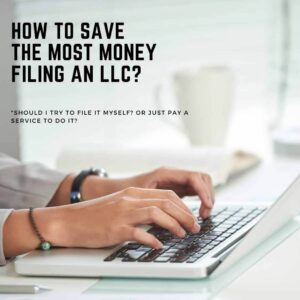Forming a Limited Liability Company (LLC) at the right time can set your business up for success. While you can start as a sole proprietor, moving to an LLC provides important benefits – from limited liability protection to potential tax advantages – that become more crucial as your business grows wolterskluwer.com. Below are clear signs and scenarios indicating when it might be time to file for an LLC.
Liability Protection: Safeguard Your Personal Assets
One primary reason to form an LLC is to shield personal assets from business liabilities. If you’re concerned about being held personally responsible for business debts or lawsuits, you should consider forming an LLC nolo.com. Signs that it’s time to get an LLC for liability protection include:
- High Risk or Potential Lawsuits: If your business is in a high-risk industry (construction, real estate, healthcare, etc.) or faces a chance of lawsuits, an LLC creates a wall between your company’s obligations and your personal property legalzoom.com. This means that in the event of a business debt or legal claim, your personal assets (home, savings, etc.) are much safer.
- Substantial Personal Assets at Stake: Even for a relatively low-risk business, the more personal assets you have, the more you have to lose. Forming an LLC early on ensures your personal wealth is protected as your business grows and encounters potential financial risks legalzoom.com.
- Hiring Employees: Once you start hiring employees, your liability exposure increases – employers are generally liable for employees’ actions on the job wolterskluwer.com. An LLC can protect you if an employee’s mistake leads to legal trouble, by keeping such liability with the business entity rather than you personally.
- Signing Contracts and Leases: Planning to sign significant contracts or lease agreements for your business is a cue to form an LLC before you sign. Having the LLC in place means the contract is in the company’s name, so if something goes wrong, the business is responsible – not you. If you sign contracts as a sole proprietor and incorporate later, you could still remain personally liable for those commitments wolterskluwer.com. In short, establish the LLC first to ensure new obligations attach to the company, not to you as an individual.
Business Growth: When Your Company is Expanding
As your business gains traction, evolves, or brings in partners, an LLC can provide a more formal structure to support that growth. Key indicators include:
- Consistent or Rising Profits: When your business starts generating steady profits, it’s a good time to think about an LLC. Many business owners decide to form an LLC once their income is reliable (though it’s wise to weigh the formation costs against your revenue at this stage) legalzoom.com. Even if profits are modest, remember that any growing business can be hit with unforeseen liabilities – if you can afford the setup, the protection may be worth it
- Adding Co-Owners or Partners: If you’re bringing on a co-founder or partner, moving from a simple sole proprietorship to an LLC is often essential. An LLC legally defines each owner’s share and role, helping to prevent conflicts. Early incorporation makes sure all co-founders are aligned on ownership and responsibilities from the start wolterskluwer.com. This clear structure can save you headaches by formalizing how decisions are made and how profits or losses are shared.
- Seeking Investors or Funding: Planning to seek outside investment or substantial financing is a strong signal to form an LLC. Investors and even informal partners are more comfortable dealing with a business that’s an actual legal entity, since an LLC offers legal protection and operational flexibility for its members legalzoom.com. In fact, some investors may require you to have an LLC (or corporation) before they invest. Forming the LLC first shows you’re serious and prepared for growth.
- Needing a Business Loan: If you intend to apply for a business loan or other credit to expand, being an LLC can be crucial. Banks and lenders often prefer (or require) lending to a registered business entity rather than to an individual. In contrast, sole proprietors can have trouble securing financing – many banks are hesitant to lend to businesses that aren’t formally organized sba.gov. By forming an LLC, you boost your credibility with lenders and improve your chances of getting approved for capital to grow your business.
Tax Benefits: Taking Advantage of Flexible Tax Options
Another factor in the LLC timing decision is when you could benefit from the LLC’s tax flexibility. Forming an LLC can offer tax advantages once your business reaches a certain point:
- Pass-Through Taxation (No Double Taxation): By default, LLCs are treated as “pass-through” entities for tax purposes, just like sole proprietorships or partnerships. This means the LLC itself typically does not pay federal income tax on its profits. Instead, profits pass through to the owners and are reported on their personal tax returns zenbusiness.com. In other words, you avoid the “double taxation” that a regular C corporation would face (where income is taxed at the corporate level and then again on the shareholders’ dividends)zenbusiness.com. If you want liability protection but also want to keep that single layer of taxation, an LLC is an ideal choice.
- Option to Elect S-Corp Status: As your profits grow, you might look for ways to reduce taxes on earnings. An LLC gives you the option to elect S Corporation tax status (by filing a form with the IRS) without changing your company’s legal structure. This is a popular move once a business’s income reaches a high enough level. By electing S-Corp treatment, LLC owners may save on self-employment taxes in certain cases zenbusiness.com. Essentially, you can pay yourself a reasonable salary and take additional profit distributions, potentially lowering the Medicare and Social Security taxes you pay. If your business is nearing a point where these tax savings would be significant, it’s a sign that having an LLC (so you can elect S-Corp) could be beneficial.
- Future Tax Flexibility: Even if you stick with default pass-through taxation now, having an LLC keeps the door open for future tax planning. LLCs can choose to be taxed as a C corporation later if it ever makes financial sense zenbusiness.com. In short, forming an LLC gives you more control over how your business income is taxed as you grow – something a sole proprietorship can’t offer.
Credibility: Proving You’re a Legitimate Business
Forming an LLC doesn’t just protect you and potentially save money – it can also enhance your business’s reputation. Consider forming an LLC when credibility becomes important for your venture:
- Enhancing Legitimacy: Many stakeholders view an LLC (or corporation) as more legitimate and professional than a solo operation. By registering your business as an LLC, you signal stability. Vendors, customers, and potential partners often see an incorporated business as more established and trustworthy wolterskluwer.com. This added credibility can be crucial when you’re trying to land bigger clients or negotiate deals – it shows you’ve made a legal commitment to your business for the long run.
- Building Customer Trust: The “LLC” after your company’s name can reassure customers that yours is a real, operating business – not just a hobby. Creating an official business entity gives you an official name to do business under and helps project a professional imagenolo.com. If you’re finding that clients or B2B customers are asking if you’re incorporated or treating your venture less seriously, it may be time to form an LLC to bolster your business’s credibility and brand.
Conclusion
There is no single universal “right” moment to form an LLC – it depends on your business’s situation. However, if one or more of the above indicators apply to you, it’s a strong sign that moving to an LLC could be a smart step. An LLC offers personal asset protection, structural flexibility, and reputational benefits that become increasingly valuable as your business matures. Just be sure to weigh the costs and responsibilities of maintaining an LLC (state filing fees, annual reports, etc.) against these benefits nolo.com. In many cases, the peace of mind and advantages an LLC provides far outweigh the fees and paperwork involved. By forming an LLC at the right time, you can protect what you’ve built, optimize your taxes, and present your venture as a credible, professional business – all of which set the stage for continued growth and success.


